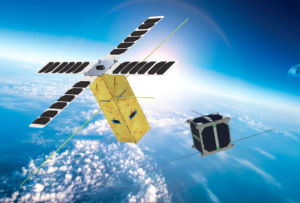Nanosatellites at the University of Montpellier
This event has passed!
Institute of Botany, Charles Flahault Lecture Hall – 163 Rue Auguste Broussonnet, 34000 Montpellier.
—
 Lecture presented by Laurent Dusseau, professor at the University of Montpellier, director of the Montpellier-Nîmes University Space Center.
Lecture presented by Laurent Dusseau, professor at the University of Montpellier, director of the Montpellier-Nîmes University Space Center.
Initially designed as objects to introduce students to space engineering, nanosatellites are now at the heart of important economic issues. The miniaturization of technology and the emergence of new markets have led to exponential growth in launches and enabled these satellites, weighing just a few kilograms, to offer access to space to new players such as universities, SMEs, and local authorities.
In this field, the University of Montpellier has gained a head start by launching France's first nanosatellite, ROBUSTA-1A, in 2012, following a six-year development program. ROBUSTA-1B took over in June 2017 and remains to this day the only operational French "CubeSat," with scientific benefits that are far from negligible. This summer, it will be joined in space by MTCUBE, while three other nanosatellites are currently being developed at the UM University Space Center with the support of the Van Allen Foundation and several big names in the space industry.
The CSUM adventure is worth telling from both a technological and human perspective. It has enabled more than 500 students to train and find jobs in a field that struggles to recruit and where strategic jobs cannot be relocated.
But if CubeSats go viral and invade space, isn't there a risk of creating debris? For several years, the CSU has been working with CNES to establish "best practices" that have enabled it to fully comply with the requirements of the law on space operations, which ensures the sustainable and shared development of space activities.
The final act of the ROBUSTA saga is being played out on Earth with the construction in 2015 of a 2,300 m² building which already houses, alongside the CSU, several leading companies in the field, thus creating a genuine ecosystem dedicated to nanosatellites and a value chain.
From the dream of a few enthusiasts to the creation of dozens, even hundreds of jobs in the region that our children, trained at UM, will be able to fill, this incredible adventure has made Montpellier the French capital of nanosatellites.
Space, yes, but with your feet firmly on the ground!
Upcoming events:
- Thursday, May 23: A rediscovered treasure: the Rennes collection of scientific instruments (1840–1900).
- Thursday, June 27: Medical imaging and innovative teaching methods.
